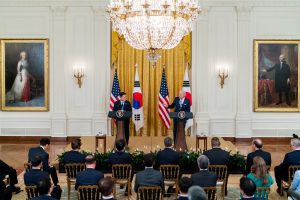Juni Kim

The United States’ chaotic withdrawal from Afghanistan and the subsequent Taliban takeover have brought up new concerns about Washington’s global security commitments and supports of its military partners. This includes South Korea, where the U.S. has maintained a heavy troop presence for over 70 years, and which is under threat of a nuclear-armed North Korea. While the Biden administration has sought to reassure its allies, including South Korea, of the United States’ continued commitment, memories are still fresh of former President Donald Trump’s “America First” policies, which questioned the nature of the South Korea-U.S. alliance. The withdrawal from Afghanistan has also spurred discussion on whether the transfer of wartime Operational Control Authority (OPCON), which the U.S. maintains in South Korea, should be sped up.
While some observers may draw parallels between Afghanistan and South Korea, there are many fundamental differences that make such comparisons difficult. Polling results highlight two particularly significant ones: the continued public support for South Korea-U.S. military relations and key national interests that are important to Americans.
Despite the controversies surrounding the United States’ messy withdrawal from Afghanistan, public polling from before and after the August withdrawal indicates that most Americans were and still are supportive of withdrawal. A Quinnipiac poll from May 2021 indicated that 62 percent of Americans approved of President Joe Biden’s decision to withdraw all troops, and a Pew poll conducted after the withdrawal from August 23 to 29 showed that 54 percent of U.S. adults said the decision to withdraw troops was the right one. This public sentiment was echoed in Biden’s reasoning in a recent interview: “I think the American people are with me… Is that worth our national interest to continue to spend another $1 trillion and lose thousands more American lives?”
Biden’s explanation here provides simple framing for the logic behind the U.S. withdrawal. There was a lack of a clear national interest that justified the committed U.S. lives and resources, and the erosion of public support for U.S. involvement in Afghanistan over the past two decades provided the political space for Biden to follow through on withdrawal.
In comparison to waning support for U.S. involvement in Afghanistan, a soon to be released KEI-YouGov study conducted in August 2021 shows that the American public largely supports the South Korea-U.S. military alliance, with 64 percent of Americans believing the alliance is in the interest of U.S. national security. In regards to U.S. troops stationed in South Korea, 57 percent of Americans would like to see the U.S. maintain or increase its troop presence, with 10 percent of respondents supporting a reduction and only 7 percent supporting a full withdrawal.
More Americans also consider South Korea a critical partner to the United States compared to Afghanistan. When asked about countries that are “critical partners” to the U.S. in the August KEI-YouGov survey, 41 percent of respondents indicated that South Korea is a critical partner. While 41 percent may seem relatively low, South Korea is on similar footing in the poll results to Australia (45 percent), Israel (48 percent), and Mexico (38 percent). In contrast, only 6 percent of Americans viewed Afghanistan as a critical partner.
In terms of identifiable U.S. interests, North Korea’s denuclearization continues to be a critical issue for most Americans. In the August survey, 86 percent of Americans said it is “very important” or “important” for the U.S. to reach an agreement for North Korea to dismantle its nuclear weapons, and 54 percent of Americans feel it is important for the U.S. and South Korea to cooperate on North Korea-related issues. More broadly, 62 percent of Americans believe that East Asia is a vital region for U.S. national interests, with countering China’s rise being a top concern among poll respondents.
The situation in Afghanistan certainly deserves U.S. attention and sympathy, but the poll results highlight how differently Americans view the United States’ security commitments to Afghanistan and South Korea. While some political and media circles may use the recent withdrawal to critique U.S. trustworthiness abroad, the South Korea-U.S. security relationship has significant American public buy-in, and the polling implies broad understanding of why the U.S. maintains a troop presence in South Korea
No comments:
Post a Comment